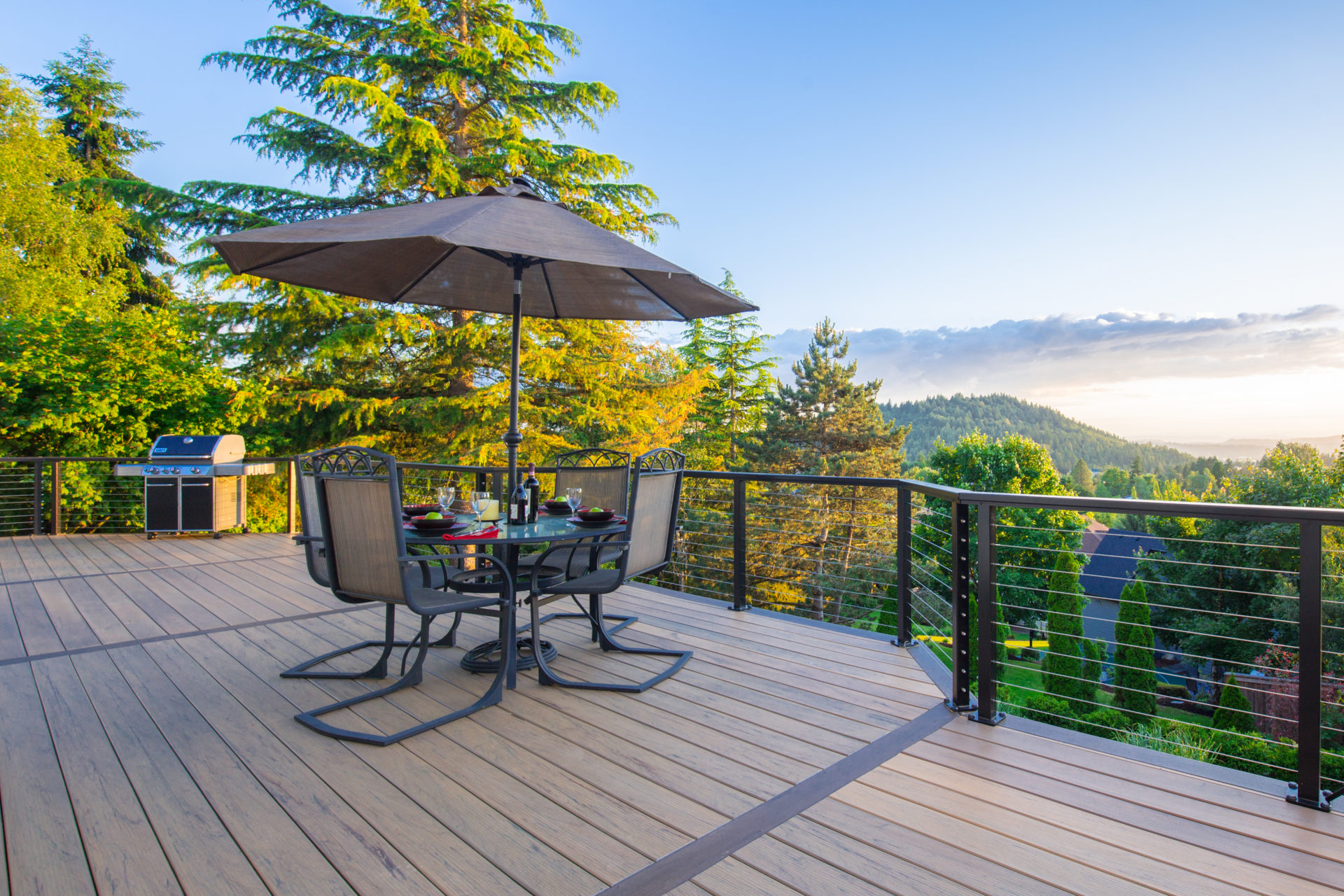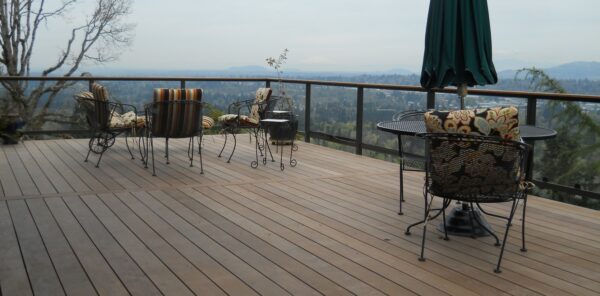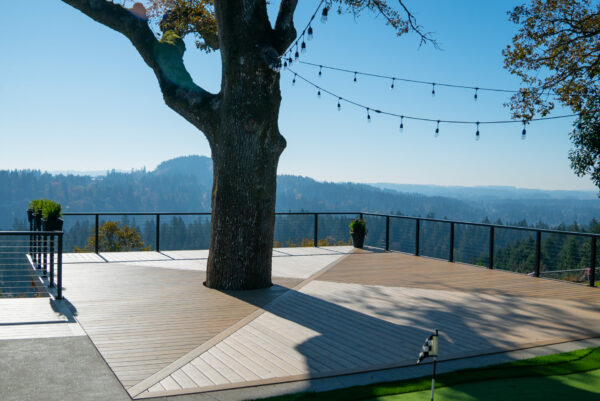Choosing the Right Material for Your Deck: Wood vs. Composite Decking
November 29th, 2022 | by Jim Gates

Installing a deck is a major investment in both your quality of life and how you enjoy your home as well as the resale value of your home.
When it comes time to choose a material, many homeowners are left wondering what’s better, composite decking vs. wood, and why?
We’ll help you decide what’s right for your home by comparing the pros and cons of wood vs. composite deck and a few factors to consider when planning your dream deck.
Table of Contents
- What’s the Difference Between Wood vs. Composite Decking?
- The Pros & Cons of Composite Decking vs. Wood
- Consider the Following When Choosing the Right Material for Your Deck
- Is Composite Decking Cheaper Than Wood?
- Ready To Build Your Custom Deck? Let Three Rivers Custom Decks Help You Decide Between a Composite vs. Wood Deck
What’s the Difference Between Wood vs. Composite Decking?
Wood and composite are entirely different materials. Wood is a natural material. The most common types of wood used for decking are:
- Cedar,
- Mahogany; and
- IPE
Other commonly used species of wood are pine and redwood, however they are not typically sold in the Pacific Northwest.
Composite, on the other hand, was invented in the 1980s and is made of wood fibers that are encased in plastic. It’s designed to have a wood look but requires very little maintenance and lasts far longer than its natural wood counterparts.
The Pros & Cons of Composite Decking vs. Wood
When making the choice between composite decking vs. wood, you want to weigh the pros and cons first and foremost, and then consider what type of material you prefer overall.
At Three Rivers Custom Decks in Portland, OR, we specialize in creating beautiful, customized decks using only the highest-quality material options available. Whether it’s composite decking vs. wood, we’ll construct the deck of your dreams.
We’ll help you select the material that best suits your vision for the perfect outdoor relaxation and entertaining area. With pros and cons to each composite vs. wood, we know how important it is to choose the material you’ll be most happy with.
We’ll start by sharing what’s great and what’s not about composite decking. It is increasingly becoming the more popular choice — and for good reason!
Composite Decking Pros
When it comes to composite decking, there are mostly pros. Not only is it virtually maintenance-free, but it’s also pest and UV-resistant.
Composite decking does not require:
- Sanding
- Staining
- Painting; or
- Sealing
It will also never rot or decay because it’s completely water-resistant. Unlike natural woods, composite won’t splinter or crack, and you need to clean it only once a year with soap and water.
On top of being far more durable and maintenance-free, composite decking typically comes with a transferable 20 to 30-year warranty.
Composite Decking Cons
When composite first entered the market, many people were turned off by the fake, plasticky look. But today, composite has a very wood-like appearance and since it never fades or requires restaining or repainting, it continues to look good for years to come.
However, some people still prefer natural wood, despite the clear advantages of composite. Composite will never look exactly like an exotic or cedarwood deck, and for some people, the familiarity of wood is more desirable.
Wood Decking Pros
One advantage to wood decking is the initial investment. Less expensive wood decks can be $5-$15 less per square food than higher-end composites.
While it may be tempting to save a few bucks up front, when you consider the cost of maintenance and repairs of a wood deck over the years, composite comes out to be less expensive in the long run.
Wood Decking Cons
Wood decking requires far more maintenance than composite, including:
- Sanding, staining, and sealing every 2 to 5 years; and
- Semi-annual cleaning
This ongoing and frequent maintenance increases the costs over time. Another downfall — weathering causes warping, cracking, splintering, and fading.
Due to being a natural material, wood decking won’t last as long as composite. On average, wood decks last 10 to 30 years, depending on the wood and maintenance, while composite can last up to 50 years.
Quality wood is also becoming harder to find and is rapidly increasing in cost.

Consider the Following When Choosing the Right Material for Your Deck
The pros and cons of composite deck vs. wood are only part of the equation when considering which material would work best for your home.
You should also factor in your personal preference for appearance, how versatile the material is, and whether climate plays a role in the durability and longevity of the material.
Appearance
Modern composites come in various embossed grain and variegated patterns that mimic the look of wood. You can easily mix and match colors to create unique designs and create accents in the decking.
Because it’s durable and doesn’t fade, composite maintains a cleaner, newer-looking appearance for much longer than wood does.
Wood, however, can have a very rich and elegant look, especially when exotic woods are used. Because wood is an organic material, it blends well with natural surroundings.
Versatility
While wood decking can be transformed by sanding and applying a new stain color, composites are manufactured to stay the same color throughout the life of the deck.
However, it is possible to stain and paint composite. It’s not an easy process, but it can be done if you really aren’t feeling the color anymore.
In terms of working with each material, they are similar when it comes to ease of assembly, but one advantage composite has over wood is how easily it can be bent. By heating the composite, you’re able to form curves that can give a lot of character to an otherwise standard-looking deck.
Composite is also a lot less slippery when wet, so poolside decking is not only safer, but it’s water-resistant and won’t rot.
Climate
Fluctuations in temperature and moisture can cause wood decking to splinter and split over time. Composite can withstand exposure to extreme weather changes without ever splintering. This is a huge bonus if you’ve got kids or pets who walk barefoot on your decking.
In hotter climates, wood has a slight advantage because it doesn’t tend to get as hot as composite. If your deck is going to be in the full sun, you might consider choosing a lighter color to help keep it cooler.
Some composite manufacturers have also incorporated technology that reduces heat absorption. This can make the material far more comfortable and bearable on the hottest days.

Is Composite Decking Cheaper Than Wood?
The average cost to install a wood deck is between $23 to $45 per square foot, whereas a composite deck can range from $30 to $60 including installation. While composite can be more expensive up front, the annual maintenance costs of wood significantly increase the overall investment.
For example, the maintenance needs of wood decking can run about $1,000 a year, but composite decking is generally less than $200 a year to maintain.
Over 20 years, that’s $20,000 in maintenance costs for wood, but only $4,000 for composite. This makes composite the more economical choice in the long run.
Ready To Build Your Custom Deck? Let Three Rivers Custom Decks Help You Decide Between a Composite vs. Wood Deck
If you’re still on the fence about choosing composite decking vs. wood, Three Rivers Custom Decks can help.
We work side-by-side with our clients when designing the perfect deck for their space. Whether your home is …
- Overlooking the Willamette Valley
- Nestled in the suburbs; or
- Situated in one of the many Historic Districts
.. Three Rivers Custom Decks can help you achieve your vision for a stunning, custom deck project.
Give us a call to schedule your no-obligation consultation and we can start planning your dream deck today.
